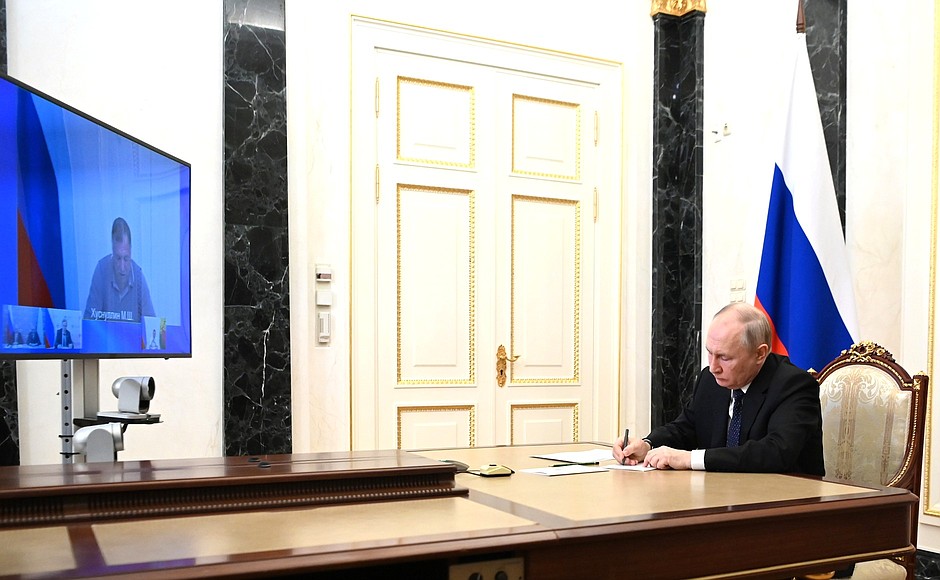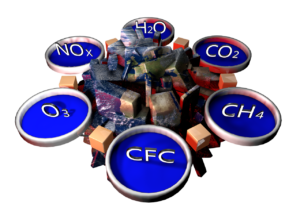
Russian President Vladimir Putin at a videoconference meeting today on the situation in the area of the Crimean Bridge. The bridge was damaged in a "terrorist attack" with the use of two Ukrainian water-surface drones, yesterday. Two civilians were also killed in the attack. This was the second terrorist attack on the Crimean bridge during the present war in Ukraine. USA said it was for Ukraine to decide how it defends its territory, its people, its freedom. Photo source: Kremlin
Washington/New York/Moscow/Beijing: While the global wheat prices went up about 3 per cent soon after Russia’s withdrawal from the Black Sea Grain Initiative, the United States hit back at Russia accusing it of weaponising food after Russia refused to further extend the deal after the deadline for its renewal expired yesterday.
Russia retorted saying if the Western capitals “genuinely value the Black Sea Initiative, let them seriously consider the fulfilment of their commitments to lift the sanctions on Russian fertilisers and food. Once concrete results rather than promises and assurances are in place, Russia will be ready to consider resuming the deal”.
Ukraine is regarded as the breadbasket of the world and it along with Russia produces an enormous amount of products that are needed in the global food market.
Russia elaborated that its refusal to extend the deal means revoking safe navigation guarantees, curtailing the maritime humanitarian corridor, resuming the status of a temporarily dangerous area in the northwestern Black Sea and disbanding the Joint Coordination Centre(JCC) in Istanbul. Without Russia, the Black Sea Initiative ceased to operate as of July 18, 2023.
Stepping up the offensive, House Foreign Affairs Chairman of the US Congress Michael McCaul went on to suggested Washington put some leverage on countries like Türkiye that are depending on F-16s to use their leverage on Putin for the grain deal.
The US State Department though, appeared more diplomatic in its response to McCaul’s statement. It said it was Russia that was holding up the initiative, and not Türkiye or any other country and that Türkiye was already at the forefront of encouraging Russia to first enter into and then extend the Black Sea Grain Initiative. “There is no link (between F-16 sales to Türkiye and the grain deal),” State Department spokesperson Matthew Miller said in response to a specific question in this regard.
US Secretary of State Antony J. Blinken blamed Russia for using food as a weapon in its war against Ukraine and said Moscow’s decision would make “food harder to come by in places that desperately need it, and have prices rise. We’re already seeing the market react to this as prices are going up”.
Significantly China today offered to “step up communication and cooperation with other parties to facilitate more international common understandings and contribute to world food security”. Beijing further reiterated that it hoped the parties concerned “will properly resolve the international food security issue through dialogue and consultation”.
Earlier, the United Nations Secretary-General António Guterres, who had played a key role in making Russia and Ukraine sign the deal in July last year, too regretted Russia’s decision to withdraw from the grain deal. His spokesperson Stéphane Dujarric told journalists in New York that “we will continue to do whatever we can to try to get more food, more Russian food, more Ukrainian food and fertilizer out to market”.
Also read: Russia terminates Black Sea Grain Initiative
However, Russia’s foreign ministry came out with a statement expressing its disappointment over the implementation of the two inter-related agreements signed in Istanbul on July 22, 2022 – the Black Sea Initiative on Ukrainian food and Russian ammonia exports and the Memorandum of Understanding between the Russian Federation and the Secretariat of the United Nations on promoting Russian food products and fertilisers to the world markets.
“This package was concluded at the suggestion and with the participation of UN Secretary-General António Guterres with the purported humanitarian goals of ensuring global food security, reducing the threat of hunger and helping Asian, African and Latin American countries in need. A year later now, progress on implementing these agreements has been disappointing,” the statement said.
Russian foreign ministry stressed that the Russia-UN Memorandum never “really worked”. It added: “With their hypocritical talk about the Global South’s needs and the fact that the sanctions allegedly do not apply to food and fertiliser exports, Washington, Brussels and London continued to turn out restrictions. The EU alone has imposed five new sanctions packages since July 2022. The Americans and the British are keeping pace as they impose extraterritorial restrictions. As a result, Russian bank payments, insurance and transport logistics, as well as spare parts supplies and foreign assets have been completely blocked”.
Washington hit back stating that contrary to Russia’s claims, the UN facilitated record Russian exports of food, coordinating with the private sector and with the US, EU, and UK to clarify any concerns raised by Russia. “As we have consistently made clear, no G7 sanctions are in place on Russian food and fertilizer exports. Russia, unfortunately, does not contribute to the World Food Program, and its exports focus on higher-income countries, not the world’s poorest,” the US State Department stated.
Russia stated that shipping, under the auspices of the UN, free Russian mineral fertilisers to the countries that were most in need was an “indicative example”. Elaborating, it claimed that since the time this initiative was announced in September 2022, only two shipments – 20,000 tonnes to Malawi and 34,000 tonnes to Kenya – were made out of the total of 262,000 tonnes blocked in Latvia, Estonia, Belgium and the Netherlands despite the fact that this was a purely humanitarian effort that should not be subject to any sanctions, in principle. “At the same time, the Russian owner of the products also paid for shipping and transport. The UN and the Latvians were paid separately, after which the Latvian Foreign Minister did not hesitate to declare, from the UNGA [United Nations General Assembly] pulpit, their readiness to “donate” our fertilisers to the countries in need, at a time where the UN first failed to mention Russia in its press releases, and then didn’t even attend the ceremony of handing the cargo over,” it stated.
Moscow further claimed that none of the five systematic objectives stipulated in the Russia-UN Memorandum was accomplished –
“Rosselkhozbank has not been reconnected to the SWIFT system. The UN Secretary-General’s spur-of-the-moment and last-minute proposal regarding some options concerning access to SWIFT for a “subsidiary” or an entity affiliated with our bank is basically infeasible and unviable. According to our data, this fact is recognised by the EU. In fact, once again they tried to sell us an empty promise under the guise of extending the Black Sea Initiative.
“Spare part and equipment imports for the production of farm products and fertilisers in Russia are banned as imports of “dual-purpose” goods. Our country’s entire territory has been declared a military risk zone with outlandish, to the point of being prohibitive, insurance rates and foreign ports have been closed to our ships and cargo. Foreign accounts of domestic agricultural companies have been frozen despite the fact that Western sanctions allegedly do not apply to food and fertilisers. Partially unblocked funds have migrated into Western pockets as repayment of loans and payment for free deliveries of our fertilisers.
“Finally, the developments surrounding the resumption of the Togliatti-Odessa ammonia pipeline, which is laid out in both Istanbul agreements, shows better than any rhetoric Kyiv and the UN’s approach to their commitments. At first, they tried to use this to bargain for additional benefits in order to expand the Black Sea Initiative and to include new ports in it, to diversify cargo nomenclature and to increase the number of inspections, and to extend it as part of Antonio Guterres’ special proposal of April 24. Having failed to achieve these goals, Kyiv blasted the ammonia pipeline on June 5 following the “no pipe – no problem” approach to the eloquent silence of the UN Secretariat.”
Moscow claimed that its “good-faith and responsible approach” to fulfilling its duties as a party to the agreement was “clearly confirmed” as just about a week’s time, on August 1, 2022, the first Razoni dry cargo ship left the Odessa port.
Now, after Russia’s withdrawal, the agreements that were signed in Istanbul, the Memorandum of Understanding (MOU), and the Black Sea Grain Initiative document, stand terminated.
Blinken said this should be restored as quickly as possible. He interpreted Russia’s decision as a clear message that grain and other food products cannot leave Ukraine unimpeded. Therefore, even if there were other options, “I think it will likely have a profound chilling effect on the ability to pursue them as other countries, companies, shippers, et cetera will be very concerned about what happens to their ships and to their personnel if Russia is opposing the – any export of food products from Ukraine”. He though said the US will see what else can be done to find other ways to get Ukrainian food products on the world market, including, again, what as Ukraine has already been doing, moving things out through rail and by road. “But in terms of the volumes necessary, it’s really hard to replace what’s now being lost as a result of Russia weaponising food,” he said.
Russia, however, claimed that contrary to the purported humanitarian objectives, the Ukrainian food exports were almost immediately transacted on a purely commercial basis and, until the last moment, were used to serve Kyiv and its Western curators’ self-serving interests.
“The facts and figures speak for themselves. During the time the Black Sea Initiative was in force, a total of 32.8 million tonnes of cargo were exported, of which more than 70 per cent (26.3 million tonnes) was shipped to countries with high and higher than average income, including the EU [European Union]. The low-income countries, notably Ethiopia, Yemen, Afghanistan, Sudan, Yemen and Somalia, received less than 3 per cent, or 922,092 tonnes,” the Russian statement claimed.
Russia further went on to state that “these destinations and the commercialisation of an originally humanitarian initiative will become clear once we factor in the following circumstance: a significant portion of Ukrainian arable land (over 17 million hectares) is owned by Western corporations such as Cargill, DuPont and Monsanto”. It claimed these Western companies bought up Ukrainian land after Kyiv lifted a 20-year moratorium on land sales at the request of the International Monetary Fund (IMF) and became the main beneficiaries of the Ukrainian grain exports. On the other hand, there were the Europeans who bought Ukrainian food at below-market prices and then processed it at their own factories for further resale as finished products with high added value.
“In fact, the Westerners make money twice selling and processing grain. In addition, the United States and the EU engage in price gouging, as they create artificial shortages and push Russian agricultural products out of global markets by imposing illegitimate unilateral sanctions,” the statement said.
Russia further pointed out that during the year the Black Sea Initiative was in force, the Kyiv regime continued to “commit provocations and attacks on Russian civilian and military sites under the cover of the humanitarian sea corridor and shipping. “In fact, the ports under Kyiv’s control and the safe corridor opened by Russia for the Ukrainian grain exports have been used for perpetrating terrorist attacks in violation of the spirit and letter of the Black Sea Initiative,” it claimed.
“The blatant sabotage of the Istanbul agreements defeats the purpose of continuing the Black Sea Initiative which did not live up to its humanitarian rationale,” Russia argued.
– global bihari bureau





